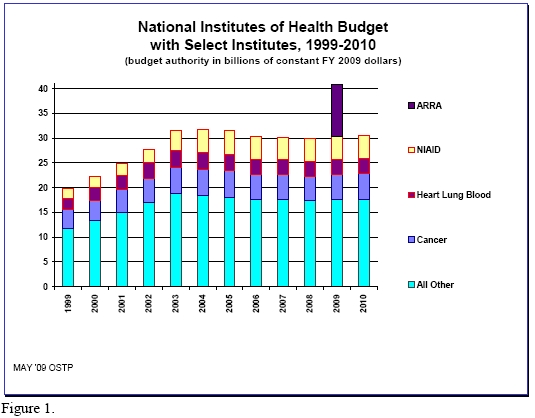정책동향
National Institutes of Health Biomedical Research in the 2010 Budget
- 등록일2009-07-10
- 조회수10445
- 분류정책동향 > 기타 > 기타
-
자료발간일
2009-05-07
-
출처
Office of Science and Technology Policy
-
원문링크
-
키워드
#NIH#National Institutes of Health#국립보건원
- 첨부파일
National Institutes of Health
Biomedical Research in the 2010 Budget
The National Institutes of Health (NIH) has at its mission the discovery of knowledge and therapies that will lead to better health outcomes for all Americans. NIH accomplishes this goal through a robust program of intramural and extramural research, education, and training conducted or sponsored by 27 Institutes and Centers.
The 2010 Budget provides $30.8 billion in appropriations for NIH (see Table), an increase of $443 million or 1.5 percent above the 2009 enacted level. In addition, NIH received $10.4 billion in Recovery Act funding, which will be spent in 2009 and 2010. After relatively sustained funding between 2004 and 2008, the Recovery Act provides an unprecedented increase for NIH. The 2010 Budget continues to support biomedical research.

The 2010 Budget includes over $6 billion to support cancer research as part of the President’s sustained commitment to double NIH-wide funding for cancer research over the next 8 years, while also maintaining growth for non-cancer research. The budget for the National Cancer Institute (NCI), the NIH leader in cancer research, increases $181 million or 3.6 percent to $5.2 billion (see Table).
In 2010, the NIH Common Fund (CF) will invest $549 million, an increase of $8 million over 2009, to support cross-cutting, trans-NIH programs that require participation by at least two NIH Institutes or Centers (ICs) or that would otherwise benefit from strategic planning and coordination (see Table). The Transformative R01 program (TRO1), a high risk/high reward initiative designed as a result of strategic planning to fund ground breaking research opportunities, will be expanded in 2010 to $70 million, double the 2009 funding level.
NIH, in partnership with other agencies in the Department of Health and Human Services (HHS), will continue to build on a total of $1.1 billion in the Recovery Act for comparative effectiveness research to produce state-of-thescience information on what medical treatments work best for a given condition. NIH’s portion of the total for comparative effectiveness research is $400 million.
....(계속)
☞ 자세한 내용은 첨부파일을 참고하시기 바랍니다.
-
이전글
- Renewed Commitment to Science and Technology Federal R&D, Technology, and STEM Education in the 2010 Budget
-
다음글
- 미래 인터넷 - 지속가능한 네트워크
관련정보
지식
- BioINwatch NAM을 통해 새로운 인간생물학모델을 개발하는 2025년 NIH 신규 프로그램, Complement-ARIE 2024-10-21
- BioINwatch 미국 NIH Common Fund 신규 프로그램 2024-09-19
- BioINwatch 미국 NIH의 체세포 유전체편집 프로그램 (Somatic Cell Genome Editing, SCGE) 2단계 진입 2023-08-29
- BioINwatch Human Virome Program(HVP), 미국 NIH Common Fund의 새로운 프로그램 2023-08-08
- BioINwatch 미국 NIH Common Fund에서 지원하는 SenNET 프로그램 2023-03-28
동향


 biomedical_2010_budget.pdf
biomedical_2010_budget.pdf